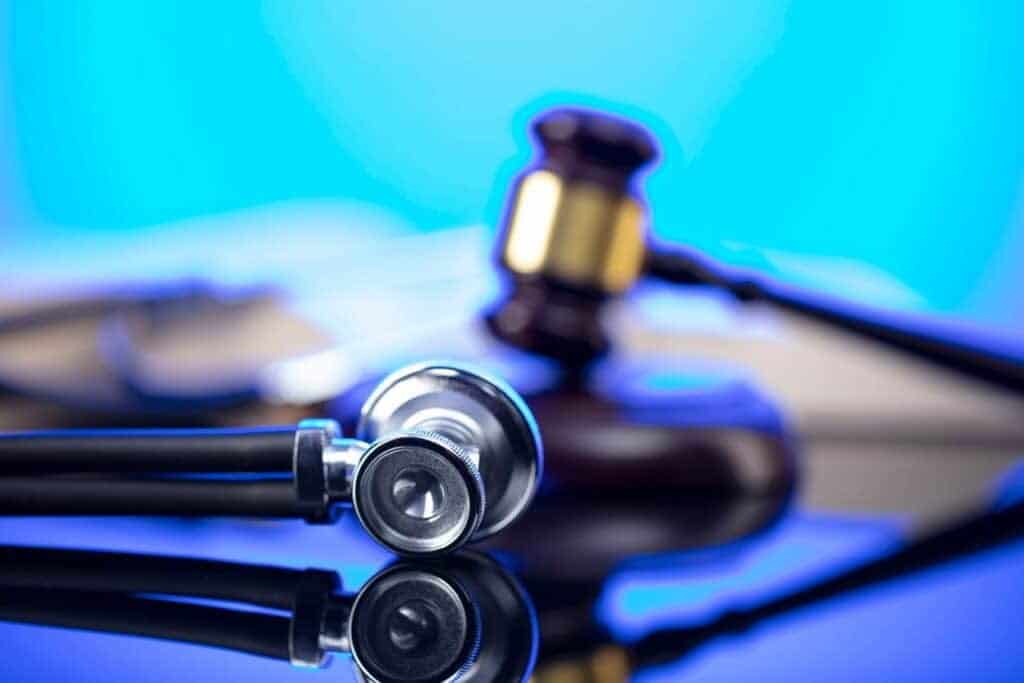Medical errors remain the third leading cause of death in the U.S.
Medical errors can be the cause of negligence and/or medical malpractice. But how do you distinguish between the two and how can these definitions impact your case?
What is the difference between negligence and malpractice?
Negligence, medical negligence, and medical malpractice have overlapping definitions, with one or all concepts present during a medical malpractice lawsuit. While these legal concepts overlap, it’s important to be able to distinguish between them and determine how they fit your case.
Working with an experienced medical malpractice lawyer can help you better understand how negligence and malpractice may exist in your case. Let’s take a closer look at how these concepts differ and when they might be applied.
Negligence
Negligence is a broad legal concept that is used to describe the level of care that someone would ordinarily or reasonably exercise in the same circumstances as another reasonable individual would.
Negligence is the basis for most personal injury lawsuits and proving negligence requires the presence of four elements:
- Having a duty to provide a reasonable level of care
- A breach of that duty
- The breach of duty caused the injury
- Financial and emotional losses were sustained as a result
Medical negligence
Medical negligence occurs when a healthcare professional fails to provide a reasonable standard of care and unknowingly, unintentionally, or ignorantly fails to take action when needed, resulting in harm to a patient. The skillset or judgment of a medical professional is not typically considered, but rather whether a medical professional took proper care when working with a patient.
Medical malpractice
Medical malpractice occurs when a healthcare professional knows and is aware of potential risks and consequences that may result from a mistake and proceeds with their actions regardless. Medical malpractice takes into consideration the skill and judgment of a medical professional. When a mistake occurs, it’s typically because procedures, protocols, or guidelines are not followed.
Examples of medical negligence and malpractice
There are many instances where medical negligence may occur. The consequences can be minimal, such as a doctor who fails to recognize harmful drug interactions and accidentally causes a patient to suffer skin irritation when taking a medication.
In more severe cases, a surgeon might accidentally puncture an organ during surgery, or fail to properly advise a patient about aftercare instructions. These cases can have more harmful effects.
In these scenarios, the intent of a healthcare professional is not to cause harm, however, harm results to the patient nonetheless.
Examples of medical malpractice
Many of these scenarios can be applied to cases of medical malpractice; however, they tend to result in more severe injuries.
If a medical professional and their team rush during surgery, they might cut corners, fail to properly sanitize surgical instruments, or inadequately prepare other members of the surgical team. This can result in a patient suffering from infections or injuries. Another example is if a doctor’s poor evaluation of a patient causes them to over-prescribe a medication that causes a patient more harm.
In these cases, the healthcare professional is aware of the risks but continues with the behavior nonetheless.
Can a medical injury be a result of both medical negligence and medical malpractice?
When working with a medical malpractice lawyer, one of the first questions is whether your medical injury is the result of medical negligence, medical malpractice, or both.
Typically, medical malpractice is a type of medical negligence. The circumstances of your case help clarify whether malpractice or negligence is at play.
After a medical injury, legal teams will consider several factors:
- What happened prior to the mistake that caused the injury?
- Was the medical professional aware of existing consequences before taking action that caused the injury?
- What protocols were in place that could have prevented the accident from happening?
- Were the protocols ignored?
- Was the mistake unintentional and could it have happened to any other individual under ordinary circumstances?
Duty of care
Healthcare professionals contend with the legal concept of “duty” or “duty of care” with every patient. This legal concept defines the relationship between you and a healthcare professional. It describes a healthcare professional’s legal responsibility to treat you in the best way they can.
If a duty of care exists, and a healthcare professional breaches this duty, it may be easier to prove that medical negligence or medical malpractice has occurred. It’s important to understand that the duty of care may change, depending on the medical professional.
Your primary healthcare provider has a greater duty of care when treating you because they know your medical history and background. This duty of care may not rise to the same level with another doctor in the same facility because they might not have a thorough understanding of your medical background.
What should I do if I have been injured due to medical malpractice or negligence?
If you’re concerned that medical malpractice or medical negligence has occurred or if your rights have been violated, you have options to ensure that the responsible party is held accountable.
Bring your concerns up to your healthcare team
Often, one of the best ways to resolve an issue following a medical disagreement is by discussing your concerns with your healthcare provider. Sometimes, the solution is as simple as a follow-up appointment where your concerns can be heard and your medical team has an opportunity to correct the issues.
Report the incident to the state licensing board
The Florida Board of Medicine is the state’s licensing board and oversees physicians practicing throughout the state. If you have complaints about a medical injury or experience with a healthcare provider or facility, the first step toward closure is filing an incident complaint. This can be done online or through the mail with the Department of Health Consumer Services Unit. Additional action — including legal action — can follow once you have filed an adverse incident form.
Contact a medical malpractice lawyer
A medical malpractice lawyer can help you further evaluate your legal options. An experienced lawyer will investigate your case and give you an initial determination of your options.
How can a medical malpractice lawyer help me?
Medical malpractice lawyers have a thorough understanding of Florida law and can help you determine whether medical malpractice or negligence is at play.
Establishing negligence
An experienced lawyer can help determine if your medical team was negligent. If your case rises to this legal standard of negligence, you may have grounds to move forward with a medical malpractice lawsuit.
Gathering evidence
Additionally, an experienced lawyer will know what evidence to gather to help support your claim. When you work with Jack Bernstein, Tampa medical malpractice lawyers, you will have the support of a comprehensive team who will collect critical evidence for your case.
Other ways a malpractice attorney can help
- Providing professional negotiating so you get the compensation you deserve
- Expert legal representation if your case goes to court
- Providing expert medical professionals who can testify in your case
If you have been hurt in an accident, contact Jack Bernstein, Injury Attorneys
Jack Bernstein’s Tampa medical malpractice lawyers are here to help you if you’ve been injured because of the negligence of a medical professional.
Sources:
Bono, M. et al. (2022). Medical Malpractice.



